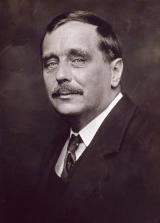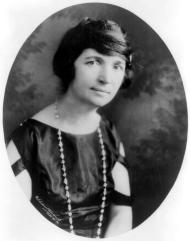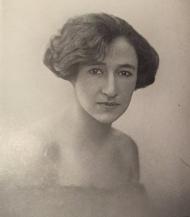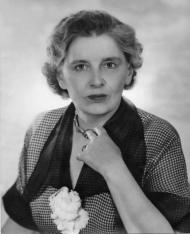Ki randizott H. G. Wells-szel?
Margaret Sanger H. G. Wells dátummal kelt, ? és ?. között A korkülönbség 12 hónapig és 11 napig tartott volt.
Odette Keun H. G. Wells dátummal kelt, ? és ?. között A korkülönbség 21 hónapig és 11 napig tartott volt.
Rebecca West H. G. Wells dátummal kelt, ? és ?. között A korkülönbség 26 hónapig és 3 napig tartott volt.
Amber Reeves H. G. Wells dátummal kelt, ? és ?. között A korkülönbség 20 hónapig és 9 napig tartott volt.
Moura Budberg H. G. Wells dátummal kelt, ? és ?. között A korkülönbség 25 hónapig és 4 napig tartott volt.
Elizabeth von Arnim H. G. Wells dátummal kelt, és . között A korkülönbség 0 hónapig és 0 napig tartott volt.
H. G. Wells

Herbert George Wells (21 September 1866 – 13 August 1946) was an English writer, prolific in many genres. He wrote more than forty novels and dozens of short stories. His non-fiction output included works of social commentary, politics, history, popular science, satire, biography, and autobiography. Wells is most known today for his groundbreaking science fiction novels; he has sometimes been called the "father of science fiction", a title that has also been given to Jules Verne and Hugo Gernsback.
In addition to his fame as a writer, he was prominent in his lifetime as a forward-looking, even prophetic social critic who devoted his literary talents to the development of a progressive vision on a global scale. As a futurist, he wrote a number of utopian works and foresaw the advent of aircraft, tanks, space travel, nuclear weapons, satellite television and something resembling the World Wide Web. His science fiction imagined time travel, alien invasion, invisibility, and biological engineering before these subjects were common in the genre. Brian Aldiss referred to Wells as the "Shakespeare of science fiction", while Charles Fort called him a "wild talent".
Wells rendered his works convincing by instilling commonplace detail alongside a single extraordinary assumption per work – dubbed "Wells's law" – leading Joseph Conrad to hail him in 1898 with "O Realist of the Fantastic!". His most notable science fiction works include The Time Machine (1895), which was his first novella, The Island of Doctor Moreau (1896), The Invisible Man (1897), The War of the Worlds (1898), the military science fiction The War in the Air (1907), and the dystopian When the Sleeper Wakes (1910). Novels of social realism such as Kipps (1905) and The History of Mr Polly (1910), which describe lower-middle-class English life, led to the suggestion that he was a worthy successor to Charles Dickens, but Wells described a range of social strata and even attempted, in Tono-Bungay (1909), a diagnosis of English society as a whole. Wells was nominated for the Nobel Prize in Literature four times.
Wells's earliest specialised training was in biology, and his thinking on ethical matters took place in a Darwinian context. He was also an outspoken socialist from a young age, often (but not always, as at the beginning of the First World War) sympathising with pacifist views. In his later years, he wrote less fiction and more works expounding his political and social views, sometimes giving his profession as that of journalist. Wells was a diabetic and co-founded the charity The Diabetic Association (Diabetes UK) in 1934.
Bővebben...Margaret Sanger

Margaret Sanger (née Higgins; September 14, 1879 – September 6, 1966) was an American birth control activist, sex educator, writer, and nurse. She opened the first birth control clinic in the United States, founded Planned Parenthood, and was instrumental in the development of the first birth control pill. Sanger is regarded as a founder and leader of the birth control movement.
In the early 1900s, contraceptives, abortion, and even birth control literature were illegal in much of the U.S.. Working as a nurse in the slums of New York City, Sanger often treated mothers desperate to avoid conceiving additional children, many of whom had resorted to back-alley abortions. Sanger was a first-wave feminist and believed that women should be able to decide if and when to have children, leading her to campaign for the legalization of contraceptives. As an adherent of the eugenics movement, she argued that birth control would reduce the number of unfit people and improve the overall health of the human race. She was also influenced by Malthusian concerns about the detrimental effects of overpopulation.
To promote birth control, Sanger gave speeches, wrote books, and published periodicals. Sanger deliberately flouted laws that prohibited distribution of information about contraceptives, and was arrested eight times. Her activism led to court rulings that legalized birth control, including one that enabled physicians to dispense contraceptives; and another – Griswold v. Connecticut – which legalized contraception, without a prescription, for couples nationwide.
Sanger established a network of dozens of birth control clinics across the country, which provided reproductive health services to hundreds of thousands of patients. She discouraged abortion, and her clinics never offered abortion services during her lifetime. She founded several organizations dedicated to family planning, including Planned Parenthood and International Planned Parenthood Federation. In the early 1950s, Sanger persuaded philanthropists to provide funding for biologist Gregory Pincus to develop the first birth control pill. She died in Arizona in 1966.
Bővebben...H. G. Wells

Odette Keun

Odette Zoé Keun (10 September 1888 in Pera – 14 March 1978 in Worthing) was a Dutch socialist, journalist and writer, who traveled extensively in Europe, including the Caucasus and the early Soviet Union.
Bővebben...H. G. Wells

Rebecca West

Dame Cecily Isabel Fairfield (21 December 1892 – 15 March 1983), known as Rebecca West, or Dame Rebecca West, was a British author, journalist, literary critic and travel writer. An author who wrote in many genres, West reviewed books for The Times, the New York Herald Tribune, The Sunday Telegraph and The New Republic, and she was a correspondent for The Bookman.
Her major works include Black Lamb and Grey Falcon (1941), on the history and culture of Yugoslavia; A Train of Powder (1955), her coverage of the Nuremberg trials, published originally in The New Yorker; The Meaning of Treason (first published as a magazine article in 1945 and then expanded to the book in 1947), later The New Meaning of Treason (1964), a study of the trial of American-born fascist William Joyce and others; The Return of the Soldier (1918), a modernist World War I novel; and the "Aubrey trilogy" of autobiographical novels, The Fountain Overflows (1956), This Real Night (published posthumously in 1984), and Cousin Rosamund (1985).
Time called her "indisputably the world's number one woman writer" in 1947. She was made CBE in 1949, and DBE in 1959; in each case, the citation reads: "writer and literary critic". She took the pseudonym "Rebecca West" from the rebellious young heroine in Rosmersholm by Henrik Ibsen. She was a recipient of the Benson Medal.
Bővebben...H. G. Wells

Amber Reeves
Amber Blanco White (née Reeves; 1 July 1887 – 26 December 1981) was a New Zealand-born British feminist writer and scholar.
Bővebben...H. G. Wells

Moura Budberg

Maria Ignatievna von Budberg-Bönninghausen (Russian: Мария (Мура) Игнатьевна Закревская-Бенкендорф-Будберг, Maria (Moura) Ignatievna Zakrevskaya-Benckendorff-Budberg, née Zakrevskaya; February 1892 – 1 November 1974), also known as Countess von Benckendorff and Baroness von Budberg, was a Russian adventuress and suspected double agent of the Soviet Union secret police (OGPU) and the British Intelligence Service.
According to the British journalist Robin Bruce Lockhart, who knew her personally, "she was, perhaps, the Soviet Union's most effective agent-of-influence ever to appear on London's political and intellectual stage".
Bővebben...H. G. Wells

Elizabeth von Arnim

Elizabeth von Arnim (31 August 1866 – 9 February 1941), born Mary Annette Beauchamp, was an English novelist. Born in Australia, she married a German aristocrat, and her earliest works are set in Germany. Her first marriage made her Countess von Arnim-Schlagenthin and her second Elizabeth Russell, Countess Russell. After her first husband's death, she had a three-year affair with the writer H. G. Wells, then later married Frank Russell, elder brother of the Nobel Prize-winner and philosopher Bertrand Russell. She was a cousin of the New Zealand-born writer Katherine Mansfield. Though known in early life as May, her first book introduced her to readers as Elizabeth, which she eventually became to friends and finally to family. Arnim published anonymously, or simply as "Elizabeth", or on one occassion as "Alice Cholmondeley". Modern bibliographers attribute her work to Elizabeth von Arnim, her preferred name when her literary career began.
Bővebben...